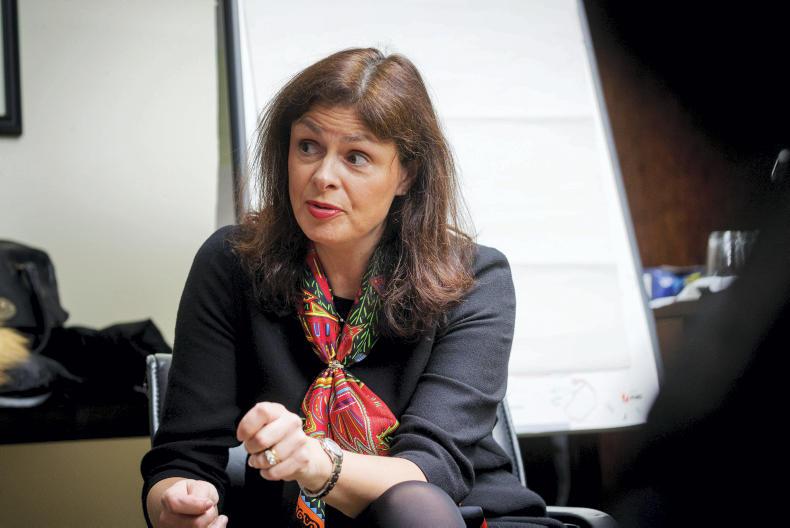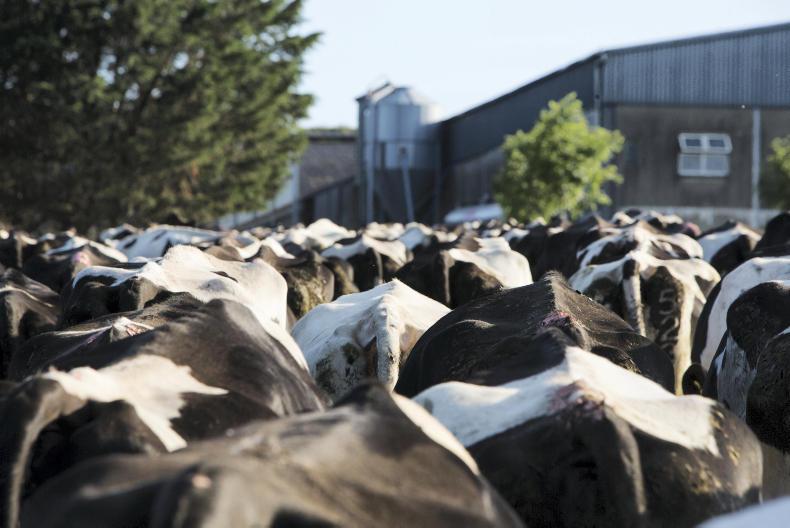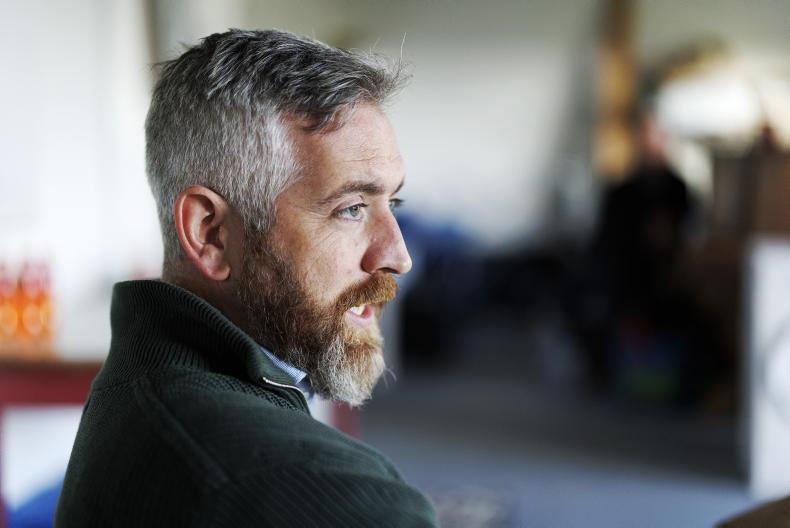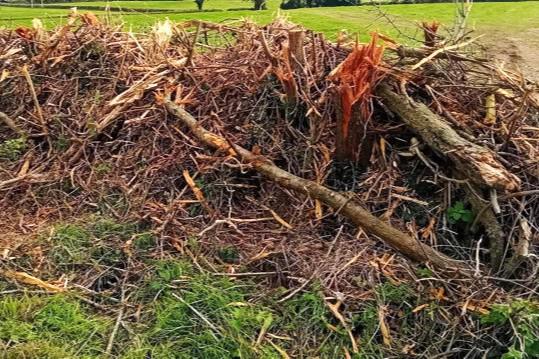When consumers are shopping only 10% of them consider the carbon footprint impact of what they’re buying, National Dairy Council CEO Zoe Kavanagh has said.
She told RTÉ’s CountryWide on Saturday morning that she sees this as a big opportunity for the body.
“Ireland is the most carbon-efficient system in the world. We produce 1% of global dairy and we’ve been measuring carbon footprints. What people need to know is dairy farmers now have a carbon footprint measure for their farm and since 2013 that has improved by 13%.
“We have expanded our production, we’ve increased by 60%, but while expanding we’ve done it in a more efficient way but we have a way to go. If this sector is to continue to thrive as it does we will have to make improvements on farm.
The view would be that we have the ability to be carbon neutral in this sector
“If you look after your soil and that’s getting our pH up to 6.3, you’ll grow more grassland and every 10 days’ extra grazing is a 1.7% reduction in greenhouse gas emissions. Increased grazing, biodiversity – if we actually calculated all the hedgerows in Ireland it would amount to the size of Co Tipperary.
“Hedgerows and grass are actually a carbon sink. The view would be that we have the ability to be carbon neutral in this sector. We have a body of work to be done but I’m very encouraged about farmers’ willingness to look at soil, water, nutrient management plans and actually become more carbon efficient.
“The idea that if we’re producing 1% of dairy in the most efficient way … to displace that would be a big mistake. If you ploughed up the land and you lost that carbon capture it would be a big mistake,” she said.
The NDC recently surveyed 2,000 Irish consumers, with 90% of them saying they believe in climate change.
“Their top three areas of concern right now are around recycling, food waste and the management of plastic within the supply chain.
“Encouragingly, 85% of consumers want the Irish dairy industry to be protected and handed over to future generations and that’s with 75% of them unaware of what our plans are around climate change,” she said.
Consumers are the new scrutineer when it comes to food and there are three areas that they need to be reassured on, the NDC chief said – nutrition, ethical production and climate change.
Dairy substitutes
Kavanagh said 41% of young, urban Irish women have declared that they are going to limit or moderate dairy in the diet.
“Our job is to reassure that questioning consumer because, simply put, the dairy substitute products are not nutritionally equivalent.
“We say that because what you’re doing is comparing a natural complete product in dairy with a product that is highly processed with 12 ingredients, double the price, a fifth of the nutrition.

Zoe Kavanagh. \ Dylan Vaughan
“Where they try and make up for the nutrition deficit compared to dairy, they are fortifying the product and that fortification comes from a range of synthetic products and they are just not as good for the body as natural dairy. So we have a body of work to reassure that consumer in three areas – fat, allergy and intolerance and when we talked to consumers we can reassure them.
“But we have a trend and the trend at the moment is image is trumping science. It’s very hard for us to land the facts but that’s our job and we’ve got to do it through a series of health professionals and ambassadors and also in stories.
“I think there’s work to be done with retailers at the point of purchase in pointing out natural goodness at an affordable price point.
“Cutting dairy out compromises intake in the area of calcium, protein and iodine. Iodine is incredibly important for cognitive function and particularly for young females planning to have a family,” she said.
Read more
Do farmers own their carbon credits?
Moorepark 2019: the blueprint for future expansion
Hedgerow carbon sink potential to be measured by 2021
When consumers are shopping only 10% of them consider the carbon footprint impact of what they’re buying, National Dairy Council CEO Zoe Kavanagh has said.
She told RTÉ’s CountryWide on Saturday morning that she sees this as a big opportunity for the body.
“Ireland is the most carbon-efficient system in the world. We produce 1% of global dairy and we’ve been measuring carbon footprints. What people need to know is dairy farmers now have a carbon footprint measure for their farm and since 2013 that has improved by 13%.
“We have expanded our production, we’ve increased by 60%, but while expanding we’ve done it in a more efficient way but we have a way to go. If this sector is to continue to thrive as it does we will have to make improvements on farm.
The view would be that we have the ability to be carbon neutral in this sector
“If you look after your soil and that’s getting our pH up to 6.3, you’ll grow more grassland and every 10 days’ extra grazing is a 1.7% reduction in greenhouse gas emissions. Increased grazing, biodiversity – if we actually calculated all the hedgerows in Ireland it would amount to the size of Co Tipperary.
“Hedgerows and grass are actually a carbon sink. The view would be that we have the ability to be carbon neutral in this sector. We have a body of work to be done but I’m very encouraged about farmers’ willingness to look at soil, water, nutrient management plans and actually become more carbon efficient.
“The idea that if we’re producing 1% of dairy in the most efficient way … to displace that would be a big mistake. If you ploughed up the land and you lost that carbon capture it would be a big mistake,” she said.
The NDC recently surveyed 2,000 Irish consumers, with 90% of them saying they believe in climate change.
“Their top three areas of concern right now are around recycling, food waste and the management of plastic within the supply chain.
“Encouragingly, 85% of consumers want the Irish dairy industry to be protected and handed over to future generations and that’s with 75% of them unaware of what our plans are around climate change,” she said.
Consumers are the new scrutineer when it comes to food and there are three areas that they need to be reassured on, the NDC chief said – nutrition, ethical production and climate change.
Dairy substitutes
Kavanagh said 41% of young, urban Irish women have declared that they are going to limit or moderate dairy in the diet.
“Our job is to reassure that questioning consumer because, simply put, the dairy substitute products are not nutritionally equivalent.
“We say that because what you’re doing is comparing a natural complete product in dairy with a product that is highly processed with 12 ingredients, double the price, a fifth of the nutrition.

Zoe Kavanagh. \ Dylan Vaughan
“Where they try and make up for the nutrition deficit compared to dairy, they are fortifying the product and that fortification comes from a range of synthetic products and they are just not as good for the body as natural dairy. So we have a body of work to reassure that consumer in three areas – fat, allergy and intolerance and when we talked to consumers we can reassure them.
“But we have a trend and the trend at the moment is image is trumping science. It’s very hard for us to land the facts but that’s our job and we’ve got to do it through a series of health professionals and ambassadors and also in stories.
“I think there’s work to be done with retailers at the point of purchase in pointing out natural goodness at an affordable price point.
“Cutting dairy out compromises intake in the area of calcium, protein and iodine. Iodine is incredibly important for cognitive function and particularly for young females planning to have a family,” she said.
Read more
Do farmers own their carbon credits?
Moorepark 2019: the blueprint for future expansion
Hedgerow carbon sink potential to be measured by 2021











SHARING OPTIONS